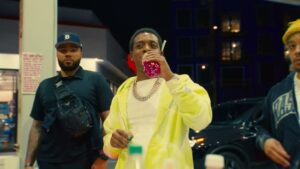In the latest episode of Bad For The Community Podcast, the crew dives into one of the most talked-about topics in the music industry right now: Timbaland’s controversial foray into AI-generated music. The legendary producer, long celebrated for shaping the sound of the late ’90s and early 2000s, is back in headlines, this time not for a beat, but for his new virtual artist, TaTa, developed in collaboration with music tech company Stability AI.
While Timbaland has expressed confidence that AI is the future of music, the hosts of Bad For The Community aren’t convinced, and they’re not alone. The episode centers on a candid, layered discussion about the broader implications of AI in music, and whether this move signals progress or something more troubling.
The podcast opens by acknowledging Timbaland’s pivotal role in music history, which makes his embrace of an AI artist all the more disorienting for the hosts. Rather than using AI tools to assist the creative process, Timbaland is going a step further, introducing TaTa, a fully AI-generated performer. The crew refers to this emerging genre as “A-pop,” featuring a virtual artist that reportedly targets K-pop fanbases with a digitally polished, hyper-controlled aesthetic.
A major thread throughout the episode is concern over how AI could reshape the industry, specifically who profits and who gets left behind. The hosts are wary of what they see as a “greedy shortcut” that could allow music executives to cut out human artists, collect full royalties, and streamline production in a way that undermines creativity.
They also point out that Timbaland isn’t the only one exploring this path. Artists like Gunna have reportedly expressed interest in signing AI-generated acts, raising questions about whether the industry is on the verge of a broader shift.
The hosts explore why Timbaland may have chosen an Asian AI artist for the launch, suggesting the move is likely aimed at tapping into the global K-pop market, which is known for its high level of production and fan engagement. They debate whether K-pop, which already operates in a highly manufactured space, could serve as a more receptive entry point for AI music compared to other genres.
Still, the group notes that even in pop-heavy genres, authenticity and artist connection matter.As the episode progresses, the conversation turns toward resistance. The speakers express real concern about AI displacing human talent, from singers and writers to producers and session musicians. One speaker even suggests boycotting AI-generated music altogether, while another cautions young artists not to enter the industry solely for money.
They also touch on the possibility of hologram concerts becoming more common, raising alarms about a future where labels could tour virtual artists globally, free of logistics, travel, or salaries.
The hosts leave listeners with an open-ended but urgent question: Is AI music the future, or are we witnessing the soul of the industry being slowly erased? While they acknowledge that technological shifts are inevitable, their stance is clear; Timbaland’s move feels more like a business pivot than a creative breakthrough.












